Drinking coffee on an empty stomach may seem like a harmless activity to jumpstart your morning – but did you know that it could potentially lead to an upset stomach or worse yet, diarrhea? Many people who have a weak digestive system may experience abdominal cramps, nausea, and loose stools shortly after drinking coffee on an empty stomach.
Study findings show that consuming coffee beverages with an empty stomach can cause a decrease in gastric acid, otherwise known as hyperacidity. Coffee itself contains caffeine and some people’s digestive systems cannot handle it without consequences. An imbalance of stomach acid can cause indigestion, abdominal pain, and diarrhea.
The problem becomes even worse if you happen to drink coffee with additives, such as cream or sugar. Consuming these additives further aggravates your stomach and can jar it into producing more acid as a response. Caffeine-based drinks can also cause dehydration, where your body is low on water, causing an irritation of your digestive tract.
Gastroenterologist, Dr. Alexander Lewis, explains that this is due to the way your body processes coffee when it is consumed on an empty stomach. The acidity from the caffeine can mix with other chemical compounds in your stomach and cause an influx of acids to flood it, causing serious discomfort. An over production of stomach acid can lead to ulcers and other serious problems.
Although there is no definitive answer as to whether drinking coffee on an empty stomach causes diarrhea, the evidence shows that drinking coffee can worsen the existing symptoms. If you are already suffering from digestive problems like indigestion, heartburn, and abdominal cramps, it would be best to wait for a little while after waking up to have your morning cup or switch to decaf. However, if you insist on drinking caffeinated coffee, have some food or snacks, such as crackers or a banana, before drinking your coffee.
Ways to Improve your Digestive System
One of the best methods to improve your digestive system is to eat smaller and more frequent meals. This way, you are allowing your stomach to digest smaller amounts of food more efficiently, decreasing any chances of stomach acids becoming imbalanced. Make sure to stay away from processed foods, as they lack fiber, which helps to naturally improve digestion. Instead, opt for fiber-rich foods such as fruits, vegetables, and whole grains as they are easier to digest and rid of the toxins in the body.
Also, try to cut down on caffeine intake. This doesn’t mean you should completely eliminate coffee from your diet. It just means that you should not drink coffee on an empty stomach. Instead, you should wait until at least an hour after breakfast or have some snacks or food before indulging in a cup of coffee.
Exercise is another effective way to improve digestion. Working out stimulates your digestive system and helps to relieve any problems associated with it. Lastly, it helps to drink plenty of water throughout the day. Water helps to flush away toxins and promote healthy digestion.
Drinking Coffee in Moderation
Drinking coffee in moderation should not cause any serious harm or damage to your digestive system. However, it is important to understand the potential side effects that can occur as a result of drinking too much coffee. It is best to stick to no more than two cups of coffee daily, and be sure to have some food or snacks with it.
Drinking coffee with an empty stomach can cause a number of digestive issues, including diarrhea. As mentioned, this problem can be avoided by eating something before consuming coffee. If you do experience any gastric distress, it is recommended to speak with a doctor or a nutritionist who can provide specialized advice.
Long Term Effects of Coffee Drinking
The long-term effects of drinking coffee on an empty stomach are still being debated. While some say it can lead to long-term health issues such as acid reflux, ulcers, and other digestive issues, other experts argue that it isn’t a major cause for concern as long as you are drinking in moderation.
It is important to remember that everyone is different and everyone’s body reacts differently to different substances. If you are experiencing symptoms like diarrhea, abdominal cramping, and nausea, it is best to speak with your doctor and ask for guidance on how to best accommodate your dietary restrictions.
Coping with Stomach Problems
If you are suffering from any stomach issues, it is important to comply with your doctor’s instructions and to be mindful of what you eat as well as the amount and frequency of coffee you consume. Taking medications prescribed by your doctor such as antacids and digestive aids can help to alleviate some of the symptoms. It is also advisable to keep a food diary and to log all of the meals you eat and any gastric disturbances you experience.
Eating foods with probiotics such as yogurt can also help to improve your digestive system. Taking probiotic supplements can be a beneficial way to introduce beneficial bacteria into your stomach and promote better digestion.
Maintaining a Healthy Diet
It is important to maintain a healthy diet – take the time to plan out your meals for the week, shop for the ingredients you need, and make the meals yourself. This way, you are in control of what you eat and can customize it to accommodate your specific dietary needs.
In addition to eating a balanced diet, it is also important to stay well hydrated. Water is essential for good digestive health, as it helps to flush out any toxins and impurities from the body. It is also important to stay away from unhealthy snacks like processed foods and sugary drinks.
Tips for Avoiding Diarrhea After Drinking Coffee
If you are looking for ways to avoid diarrhea after drinking coffee on an empty stomach, the best way is to make sure that you are eating something before drinking it. This will help to buffer the effects of the acidity in the coffee, reducing the chances of any gastric distress.
You can also switch to decaf coffee, as it contains significantly less caffeine than regular coffee and will not irritate your stomach. In addition, make sure to drink plenty of water throughout the day, as water helps to balance your body’s electrolytes and it can also help to prevent dehydration.
Lastly, it is important to stay away from coffee beverages with additives such as cream or sugar. These can further aggravate your stomach and should be avoided when possible.




